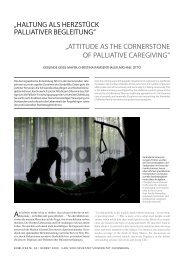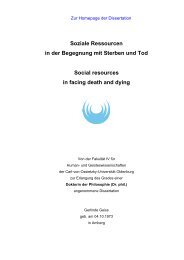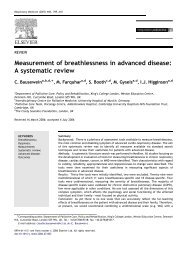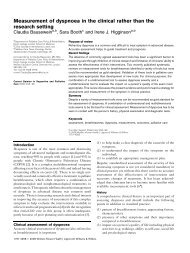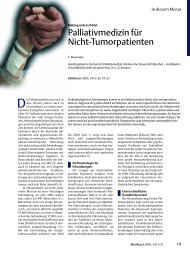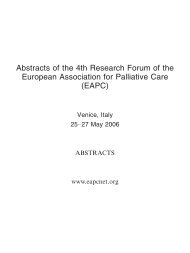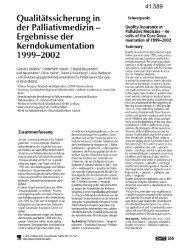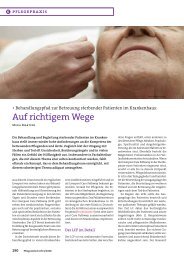EAPC - ipac
EAPC - ipac
EAPC - ipac
You also want an ePaper? Increase the reach of your titles
YUMPU automatically turns print PDFs into web optimized ePapers that Google loves.
428 <strong>EAPC</strong> Abstracts<br />
the Diana Fund, IPCI and the National Hospice and Palliative Care<br />
Organization to support research on palliative care in Africa. Individual<br />
country initiatives in Britain, the United States and Canada, both governmental<br />
and non-governmental, have given some priority to palliative care<br />
research as well. There is enormous need to attempt to codify and clarify<br />
the current status of research in palliative care funding throughout the world<br />
to assess the percentage of palliative care funding compared to others.<br />
95 Invited Lecture<br />
How to improve research funding and capacity building in a<br />
world wide perspective<br />
How to improve research funding and capacity building in a<br />
world wide prospective<br />
Australian National Initiatives<br />
Authors: David Currow Palliative & Supportive Services Flinders<br />
University AUSTRALIA<br />
In order to improve the evidence base for quality palliative care, it is necessary<br />
to invest in research infrastructure. Given the nature of research in<br />
palliative care, multi-site studies are absolutely crucial to refine the practice<br />
to specific subgroups of the population. As such, the Australian<br />
Government together with other national organisations have cooperated to<br />
create significant palliative care research infrastructure. This includes: – A<br />
dedicated grants program through the National Health and Medical<br />
Research Council; – A competitive Doctoral program; – A national program<br />
to improve the evidence for prescribing palliative medications (including<br />
their cost effectiveness and safety); – Infrastructure for multi-site data.<br />
Together, this investment represents an ability of the palliative care community<br />
to build capacity for quality research while answering practical questions<br />
on day to day service delivery and therapeutics.<br />
96 Invited Lecture<br />
How to improve research funding and capacity building in a<br />
world wide perspective<br />
How to improve research funding and capacity building in a<br />
world wide prospective:<br />
Canadian National Initiatives<br />
Authors: Neil Hagen Division of Palliative Medicine University of Calgary<br />
CANADA<br />
Canada has experienced a remarkable national growth in palliative care<br />
research funding and capacity over the past decade. This situation resulted<br />
from alignment of several distinct cultural, political and organizational<br />
changes, and strategically targeted activities from key non-governmental,<br />
professional and governmental organizations. Cultural changes in Canada<br />
have included an emerging grass-roots public interest in palliative and end<br />
of life care. Political factors involved major initiatives by the Senate of<br />
Canada, culminating in a pivotal report in 2000, “Quality end of life care,<br />
the right of every Canadian” which has continued to impact national and<br />
provincial policy since. The establishment of a new national health<br />
research organization in 2001, the Canadian Institutes for Health Research<br />
(CIHR), offered the opportunity to shape national priorities in research,<br />
and in 2002 it identified palliative and end of life care as its top cancer<br />
research priority. Non-governmental organizations such as the Canadian<br />
Cancer Society, and numerous professional groups such as the Canadian<br />
Society of Palliative Care Physicians, advocated for this and related developments.<br />
In 2003 the CIHR earmarked $16.5 million dollars toward New<br />
Emerging Teams grants in palliative care, and a total of 10 multicenter<br />
teams were awarded five-year grants. The focus of these teams ranged<br />
from pediatrics to geriatrics, from difficult pain problems to delirium, and<br />
most major academic health care organizations in Canada involving the<br />
entire range of professionals including physicians, nurses, psychologists,<br />
and basic through clinical researchers, have become engaged in these initiatives.<br />
However, it has been challenging for the palliative care research<br />
community to develop the level of maturity needed to sustain such national<br />
activity and growth. This presentation outlines the major factors that<br />
contributed to national successes to date, barriers we encountered and<br />
future challenges we face.<br />
97 Invited Lecture<br />
How to improve research funding and capacity building in a<br />
world wide perspective<br />
How to improve research funding and capacity building in a<br />
world wide prospective<br />
Latin American National Initiatives<br />
Authors: Jorge Hugo Eisenchlas Palliative Care Unit Pallium<br />
Latinoamerica ARGENTINA<br />
Research in palliative care has increased significantly in the last decade,<br />
but while more than 80% of the global disease burden occurs in<br />
developing countries, the proportion of research conducted in these<br />
settings accounts for less than 10 per cent of all global research activity. In<br />
Latin America, in spite of the increase of palliative care initiatives across<br />
the region, research efforts are still very limited. Consequently, there is a<br />
lack of local evidence which on one hand, plays against knowledge<br />
advance and practice improvement and, on the other hand, complicate the<br />
institution of policies able to improve palliative care delivery. Altogether,<br />
these factors form a vicious circle which results in limited visibility of<br />
palliative care, which results in limited political support and funding. We<br />
have now a broad view concerning what happens in the region, and we also<br />
have a supportive document, like the Declaration of Venice. It is crucial<br />
that recommendations and proposals take into account feedback provided<br />
not only by donors but also local leaders from developing countries, who<br />
are the best source of information about the needs, challenges and barriers<br />
present at the local level.<br />
98 Invited Lecture<br />
How to improve research funding and capacity building in a<br />
world wide perspective<br />
How to improve research funding and capacity building<br />
Authors: Stein Kaasa Palliative Medicine Unit St. Olav’s Hospital NORWAY<br />
Palliative Care research has been steadily improving during the last<br />
decade. Despite these improvements national and international evaluations<br />
have identified several limitations and areas for improvement, ranging<br />
from the laboratory bench to the bed side and into the health care policy<br />
arena. – Improved understanding of the basic biological mechanisms<br />
behind symptoms; – Symptom classification – common international<br />
system; – Symptom assessment – common international assessment tools;<br />
– Research staff; Training of junior researchers; Permanent chairs in palliative<br />
medicine, palliative care nursing and other areas. – Establishment of<br />
sustainable research groups of sufficient size with interdisciplinary knowledge<br />
and capacity; – Improve the quality of the research conducted – move<br />
from descriptive studies to intervention studies; – To develop national and<br />
international partnership; – Apply the optimal research methodology fitting<br />
the research question. There are substantial barriers to research to reach<br />
some of the items addressed. Some barriers are found within the systems<br />
of palliative care, such as scepticism in many clinical environments<br />
towards research and the lack of prioritizing research. These we need to<br />
address ourselves. Others are found on the arena where Palliative Care<br />
collaborates with other parts of the health care system, other professions<br />
and even outside health care environment. Here we need to ask the right<br />
questions in order to fertilize collaboration. Economically we need to<br />
produce high quality research in funded research groups within several<br />
countries in the world in order to ensure long lasting funding, nationally<br />
and internationally.



